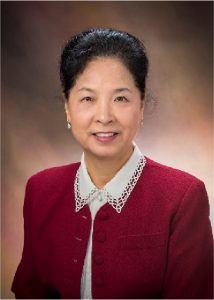Cancer Genomics Lab Director
Division of Genomic Diagnostics

Dr. Marilyn Li is responsible for providing clinical application of high-throughput molecular technologies for integrated cancer genomic diagnosis, liquid biopsy for cancer screen, risk stratification and monitoring, characterization of tumorigenesis roles of novel fusions identified during RNA-seq of tumor tissues and molecular diagnosis for all projects within the clinical trials unit of D³b.
Marilyn M. Li, M.D. is a Professor of Pathology and Laboratory Medicine, Professor of Pediatrics, Vice Chief of the Division of Genomic Diagnostics, Director of Cancer Genomic Diagnostics at Children’s Hospital of Philadelphia, University of Pennsylvania, Perelman School of Medicine. Dr. Li received her M.D. degree at Tongji Medical College of Huazhong University of Science and Technology and had her fellowship training in Clinical Cytogenetics and Clinical Molecular Genetics at University of Pennsylvania/Children’s Hospital of Philadelphia. She holds American Board of Medical Genetics certification in Clinical Cytogenetics and Clinical Molecular Genetics. Prior to her appointment at CHOP, she served as the director of Cancer Genetics Laboratory, Baylor College of Medicine, the director of the Tulane Clinical Cytogenetics Laboratory, Clinical Molecular Genetics Laboratory, Tulane Matrix DNA Diagnostic Laboratory, and the director of the Genomics Core Laboratory of Louisiana Cancer Research Consortium. She is a fellow of ACMG, ASHG, SWOG, AMP, ASH, and ASCO. Dr. Li’s primary research interest is clinical application of microarray and next generation sequencing technologies in cancer research and clinical diagnosis. Her group has studied thousands of cancer genomes using custom-designed cancer-specific arrays, cancer-specific next generation sequencing panels and cancer exomes. Their experience demonstrated that these state of the art technologies detect many previously known or unrecognized genomic alterations that can be used for cancer diagnosis, risk stratification, disease follow-up, and therapeutic selection. She initiated, organized and is the first president of the Cancer Genomics Consortium, an international consortium whose mission is to facilitate the development and utilization of microarray-based technology and NGS technology for high quality, reliable cancer genetic testing in diagnostic laboratories. She chairs the AMP working group composed of members from AMP, ACMG, CAP, and ASCO to create Standards and Guidelines for Sequence Variant Interpretation and Reporting in Cancer. She is the recipient of the 2010-2011 Luminex/ACMGF Award for the promotion of safe and effective genetic testing and services. Other research projects in her lab include studies of common leukemia- and lymphoma-associated genetic aberrations in healthy individuals and mosaic overgrowth syndromes and chromosome microdeletion syndromes. She is an active member of the medical school and is involved in teaching medical students and Ph.D. students, and training residents and fellows.
